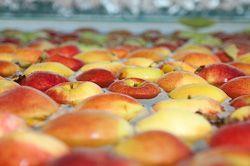
New Zealand growers will this year export their lowest volume of Braeburn apples in 15 years, according to industry body Pipfruit New Zealand.
The country’s exporters will send only 3.7m cartons (65,000 tonnes) of Braeburn to international markets this year, a significant drop on the pre-harvest estimate of 4.5m cartons, the body said in its latest crop forecast.
“Growers have reacted to market signals and have decided to intervene in the Braeburn supply this season,” said Pipfruit NZ CEO Peter Beaven.
Europe remains the main market for the variety, and returns in recent seasons have been poor. This season in Europe, which is about to start with the arrival of the first fruit, is not expected to be any better.
This year’s forecast low export carries on from last year’s own recent history record low, at slightly higher volume at 3.8m cartons.
Exporter actions
“Growers have had enough and have given their exporters an ultimatum,” said Mr Beaven. “Either deliver sustainable returns from those markets or expect to see the variety disappear.
“We know New Zealand Braeburn is a very good apple and there is good demand for it, but it will be up to our importers to show that they can deliver sustainable economic returns and that there is still a place for Braeburn in our orchards.”
New Zealand exporters have taken the message to heart, and are this year launching their first Braeburn cooperative branding and promotional efforts in Europe using the ‘100% Pure Apples from New Zealand’ branding developed by Pipfruit NZ.
The campaign builds on early efforts at a cooperative marketing plan in Europe for the variety last year.
Exporters accounting for about 90 per cent of the New Zealand Braeburn crop have agreed to support the European promotion, covering all the major industry players.
Shift to Asia
Mr Beaven said the declining international opportunities for Braeburn are steadily pushing exporters to expanding Asian markets, and growers to varieties that fill demand there such as Royal Gala, Fuji and the New Zealand/Pacific series.
“Braeburn has limited appeal in other markets such as Asia,” stated Mr Beaven.
“Several years of poor returns for Braeburn will drive grower decisions to exit the variety in favour of change away from European supply. The Braeburn variety is in danger of becoming a casualty of this global economic shift to Asia.”



